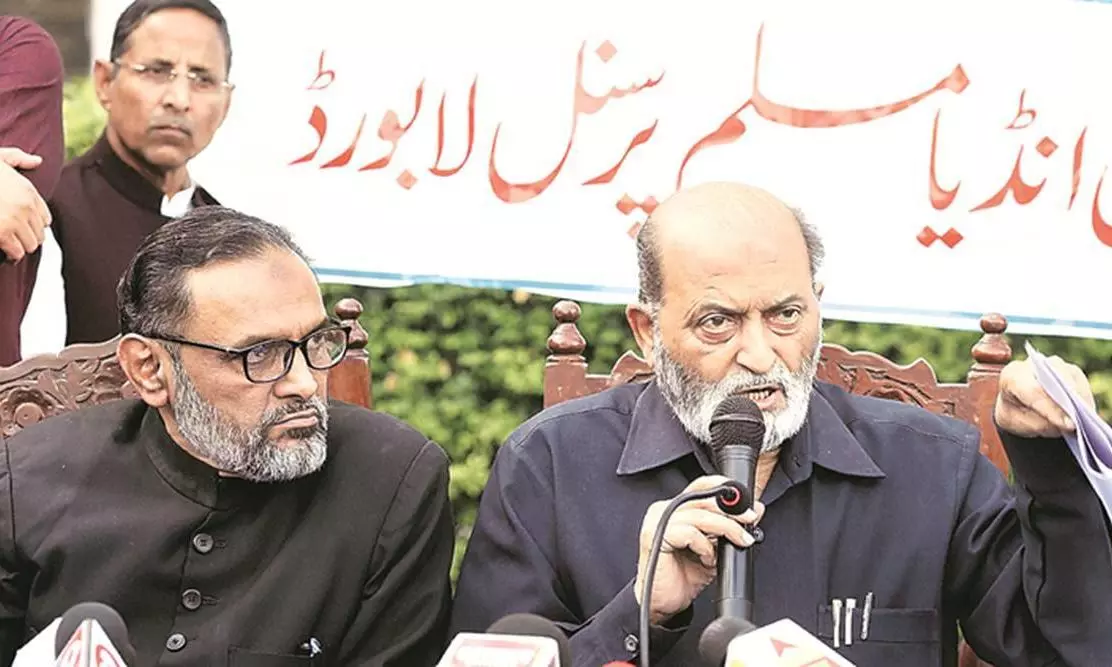
AIMPLB urges exclusion of religion from UCC to safeguard minority rights from majoritarian morality
text_fieldsNew Delhi: The detailed representation sent to the Law Commission of India, expressing strong opposition against the Uniform Civil Code (UCC), the All India Muslim Personal Law Board (AIMPLB) urged the Union government that ‘majoritarian morality’ should not be allowed to override the religious freedom and the rights of minority communities.
The AIMPLB's 100-page representation was submitted in response to the Law Commission's request for public opinion on the UCC, which was announced on June 14. After thorough discussions on the matter, the AIMPLB decided to articulate its concerns regarding the proposed code.
Referring to the Indian Constitution to emphasise the importance of keeping diversity in the country, the AIMPLB said that the special rights status given to various groups in the constitution itself establishes that it not only extols but also protects the diversity within the country.
Drawing attention to the religious nature of Muslim personal law, the AIMPLB emphasized its direct derivation from the Holy Quran and Sunnah, which holds significant importance to the Muslim community's identity. The representation stressed that any attempt to dilute or discard these personal laws would be unacceptable to Indian Muslims.
The AIMPLB further argued that maintaining the diversity of the nation by allowing minorities and tribal communities to govern themselves according to their respective personal laws is crucial for preserving national integrity, safety, security, and fraternity.
While the UCC proposal aims to establish a common set of laws for all citizens irrespective of religious affiliations, the AIMPLB's representation calls for respecting the unique identities and religious practices of different communities within the constitutional framework.
As the Law Commission continues to examine the matter and gather public opinion on the UCC, the AIMPLB's representation adds a crucial perspective to the ongoing debate surrounding the uniformity of civil laws in India. It remains to be seen how this dialogue will shape the future trajectory of legal reforms and the protection of minority rights in the country.
The AIMPLB demanded that every religious minority should also be kept out of the purview of the UCC along with the tribal communities.
The working committee of the Board had approved the draft response prepared on UCC in the executive meeting on June 27 and on Wednesday it was presented for discussion in the virtual general meeting of the Board, the spokesman of the Board Kasim Rasool Ilyas told PTI.
This report was unanimously approved, after which it has been sent to the Law Commission, he said. The Law Commission had given time till July 14 to various parties and stakeholders to file their objections to the UCC.
The All India Muslim Personal Law Board (AIMPLB) had earlier requested to extend the time by six months.
Ilyas said that around 250 out of 251 members of the Board attended the meeting in which they were asked to present their views against the UCC personally before the Law Commission and encourage their relatives, friends and others to do the same.
The AIMPLB is of the view that not only tribals but every religious minority should also be kept out of the purview of UCC, he said.
The chairman of the parliamentary committee on law and BJP MP Sushil Modi had on Monday advocated keeping tribals, including those in the North East, out of the purview of any likely Uniform Civil Code (UCC) at a meeting of the panel, according to sources.
Ilyas said, “The All India Muslim Personal Law Board has always been against the UCC. It is of the view that imposing only one law in the name of UCC in a country like India, which consists of people belonging to multi religions and cultures, is a violation of democratic rights.”
The AIMPLB is a prominent Muslim non-governmental organisation formed in 1973 with the objective of protecting and promoting the application of Islamic personal law among Muslims in India.
The Law Commission has initiated the fresh consultation process on the Uniform Civil Code by seeking views from stakeholders, including public and recognised religious organisations.
Prime Minister Narendra Modi recently made a strong pitch for bringing UCC and alleged that the Opposition is using the issue to mislead and provoke the Muslim community.






















